Complications of Premature Babies: Hypothermia, Hypoxia and Hypoglycemia
VerifiedAdded on 2023/06/07
|9
|2425
|352
AI Summary
Premature babies are at risk of developing hypoxia, hypothermia and hypoglycaemia which are interconnected into a triangle of complications. The World Health Organization (2018) has estimated that about 1 million newborns die annually from the complications of prematurity. This article discusses the causes and prevention of these complications and the role of midwives and families in the care of premature babies.
Contribute Materials
Your contribution can guide someone’s learning journey. Share your
documents today.
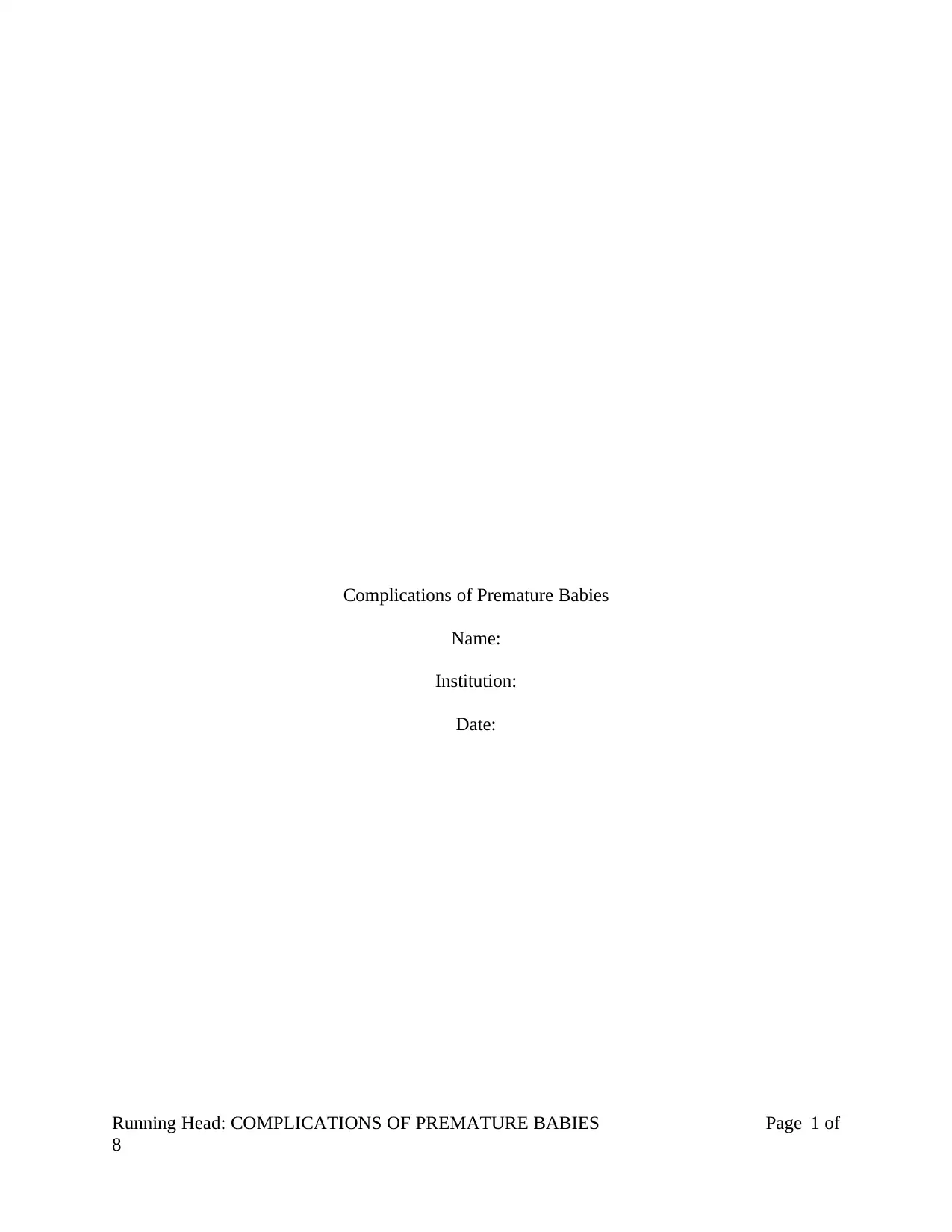
Complications of Premature Babies
Name:
Institution:
Date:
Running Head: COMPLICATIONS OF PREMATURE BABIES Page 1 of
8
Name:
Institution:
Date:
Running Head: COMPLICATIONS OF PREMATURE BABIES Page 1 of
8
Secure Best Marks with AI Grader
Need help grading? Try our AI Grader for instant feedback on your assignments.
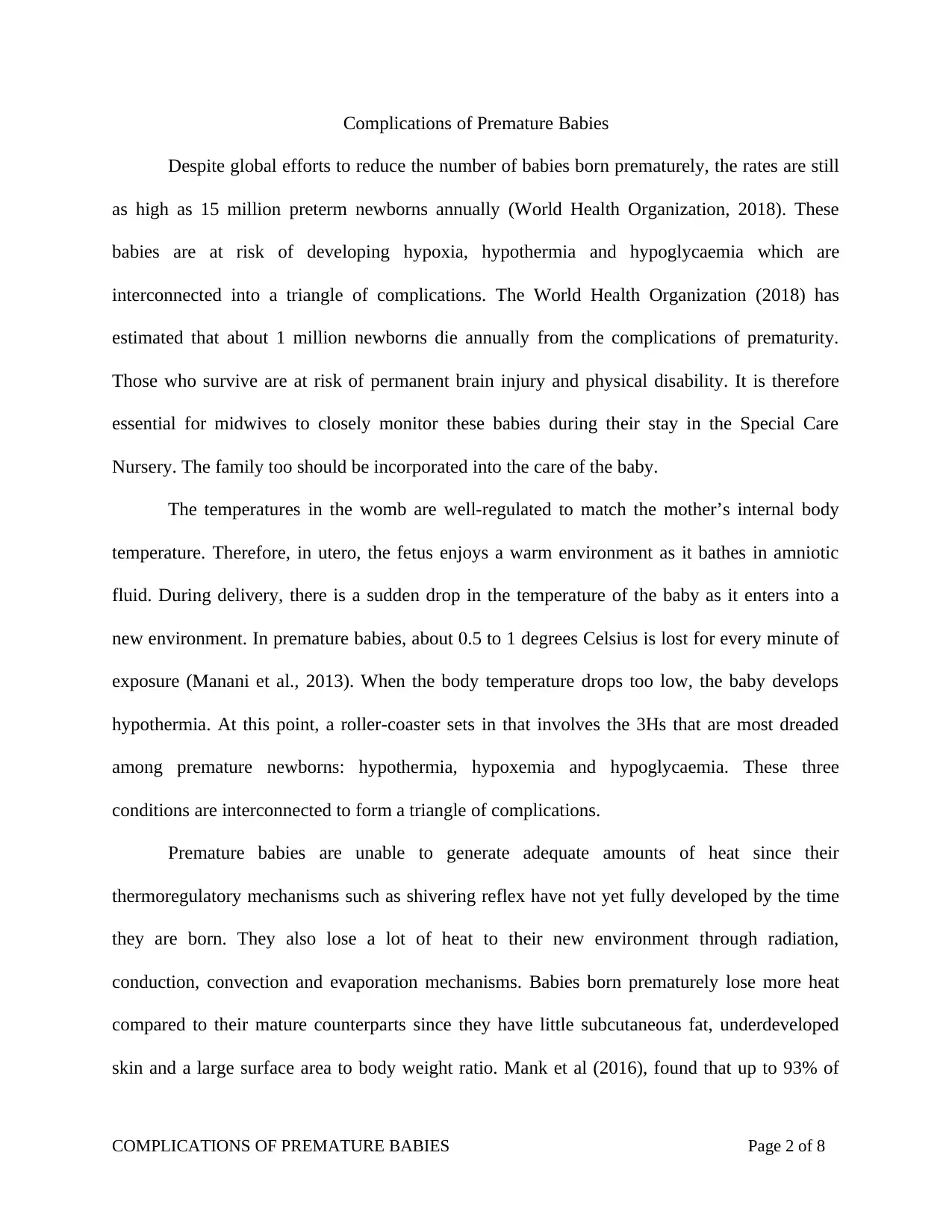
Complications of Premature Babies
Despite global efforts to reduce the number of babies born prematurely, the rates are still
as high as 15 million preterm newborns annually (World Health Organization, 2018). These
babies are at risk of developing hypoxia, hypothermia and hypoglycaemia which are
interconnected into a triangle of complications. The World Health Organization (2018) has
estimated that about 1 million newborns die annually from the complications of prematurity.
Those who survive are at risk of permanent brain injury and physical disability. It is therefore
essential for midwives to closely monitor these babies during their stay in the Special Care
Nursery. The family too should be incorporated into the care of the baby.
The temperatures in the womb are well-regulated to match the mother’s internal body
temperature. Therefore, in utero, the fetus enjoys a warm environment as it bathes in amniotic
fluid. During delivery, there is a sudden drop in the temperature of the baby as it enters into a
new environment. In premature babies, about 0.5 to 1 degrees Celsius is lost for every minute of
exposure (Manani et al., 2013). When the body temperature drops too low, the baby develops
hypothermia. At this point, a roller-coaster sets in that involves the 3Hs that are most dreaded
among premature newborns: hypothermia, hypoxemia and hypoglycaemia. These three
conditions are interconnected to form a triangle of complications.
Premature babies are unable to generate adequate amounts of heat since their
thermoregulatory mechanisms such as shivering reflex have not yet fully developed by the time
they are born. They also lose a lot of heat to their new environment through radiation,
conduction, convection and evaporation mechanisms. Babies born prematurely lose more heat
compared to their mature counterparts since they have little subcutaneous fat, underdeveloped
skin and a large surface area to body weight ratio. Mank et al (2016), found that up to 93% of
COMPLICATIONS OF PREMATURE BABIES Page 2 of 8
Despite global efforts to reduce the number of babies born prematurely, the rates are still
as high as 15 million preterm newborns annually (World Health Organization, 2018). These
babies are at risk of developing hypoxia, hypothermia and hypoglycaemia which are
interconnected into a triangle of complications. The World Health Organization (2018) has
estimated that about 1 million newborns die annually from the complications of prematurity.
Those who survive are at risk of permanent brain injury and physical disability. It is therefore
essential for midwives to closely monitor these babies during their stay in the Special Care
Nursery. The family too should be incorporated into the care of the baby.
The temperatures in the womb are well-regulated to match the mother’s internal body
temperature. Therefore, in utero, the fetus enjoys a warm environment as it bathes in amniotic
fluid. During delivery, there is a sudden drop in the temperature of the baby as it enters into a
new environment. In premature babies, about 0.5 to 1 degrees Celsius is lost for every minute of
exposure (Manani et al., 2013). When the body temperature drops too low, the baby develops
hypothermia. At this point, a roller-coaster sets in that involves the 3Hs that are most dreaded
among premature newborns: hypothermia, hypoxemia and hypoglycaemia. These three
conditions are interconnected to form a triangle of complications.
Premature babies are unable to generate adequate amounts of heat since their
thermoregulatory mechanisms such as shivering reflex have not yet fully developed by the time
they are born. They also lose a lot of heat to their new environment through radiation,
conduction, convection and evaporation mechanisms. Babies born prematurely lose more heat
compared to their mature counterparts since they have little subcutaneous fat, underdeveloped
skin and a large surface area to body weight ratio. Mank et al (2016), found that up to 93% of
COMPLICATIONS OF PREMATURE BABIES Page 2 of 8
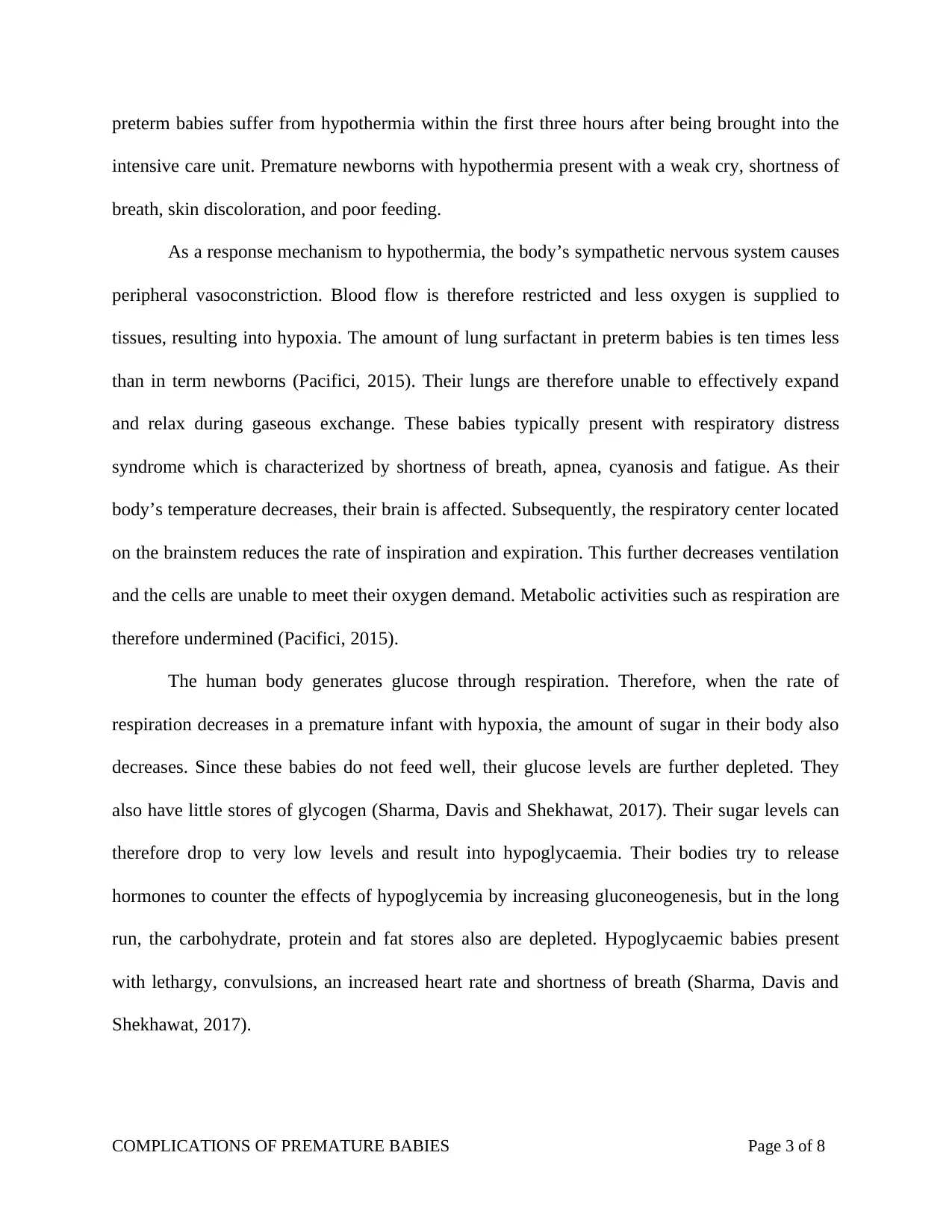
preterm babies suffer from hypothermia within the first three hours after being brought into the
intensive care unit. Premature newborns with hypothermia present with a weak cry, shortness of
breath, skin discoloration, and poor feeding.
As a response mechanism to hypothermia, the body’s sympathetic nervous system causes
peripheral vasoconstriction. Blood flow is therefore restricted and less oxygen is supplied to
tissues, resulting into hypoxia. The amount of lung surfactant in preterm babies is ten times less
than in term newborns (Pacifici, 2015). Their lungs are therefore unable to effectively expand
and relax during gaseous exchange. These babies typically present with respiratory distress
syndrome which is characterized by shortness of breath, apnea, cyanosis and fatigue. As their
body’s temperature decreases, their brain is affected. Subsequently, the respiratory center located
on the brainstem reduces the rate of inspiration and expiration. This further decreases ventilation
and the cells are unable to meet their oxygen demand. Metabolic activities such as respiration are
therefore undermined (Pacifici, 2015).
The human body generates glucose through respiration. Therefore, when the rate of
respiration decreases in a premature infant with hypoxia, the amount of sugar in their body also
decreases. Since these babies do not feed well, their glucose levels are further depleted. They
also have little stores of glycogen (Sharma, Davis and Shekhawat, 2017). Their sugar levels can
therefore drop to very low levels and result into hypoglycaemia. Their bodies try to release
hormones to counter the effects of hypoglycemia by increasing gluconeogenesis, but in the long
run, the carbohydrate, protein and fat stores also are depleted. Hypoglycaemic babies present
with lethargy, convulsions, an increased heart rate and shortness of breath (Sharma, Davis and
Shekhawat, 2017).
COMPLICATIONS OF PREMATURE BABIES Page 3 of 8
intensive care unit. Premature newborns with hypothermia present with a weak cry, shortness of
breath, skin discoloration, and poor feeding.
As a response mechanism to hypothermia, the body’s sympathetic nervous system causes
peripheral vasoconstriction. Blood flow is therefore restricted and less oxygen is supplied to
tissues, resulting into hypoxia. The amount of lung surfactant in preterm babies is ten times less
than in term newborns (Pacifici, 2015). Their lungs are therefore unable to effectively expand
and relax during gaseous exchange. These babies typically present with respiratory distress
syndrome which is characterized by shortness of breath, apnea, cyanosis and fatigue. As their
body’s temperature decreases, their brain is affected. Subsequently, the respiratory center located
on the brainstem reduces the rate of inspiration and expiration. This further decreases ventilation
and the cells are unable to meet their oxygen demand. Metabolic activities such as respiration are
therefore undermined (Pacifici, 2015).
The human body generates glucose through respiration. Therefore, when the rate of
respiration decreases in a premature infant with hypoxia, the amount of sugar in their body also
decreases. Since these babies do not feed well, their glucose levels are further depleted. They
also have little stores of glycogen (Sharma, Davis and Shekhawat, 2017). Their sugar levels can
therefore drop to very low levels and result into hypoglycaemia. Their bodies try to release
hormones to counter the effects of hypoglycemia by increasing gluconeogenesis, but in the long
run, the carbohydrate, protein and fat stores also are depleted. Hypoglycaemic babies present
with lethargy, convulsions, an increased heart rate and shortness of breath (Sharma, Davis and
Shekhawat, 2017).
COMPLICATIONS OF PREMATURE BABIES Page 3 of 8
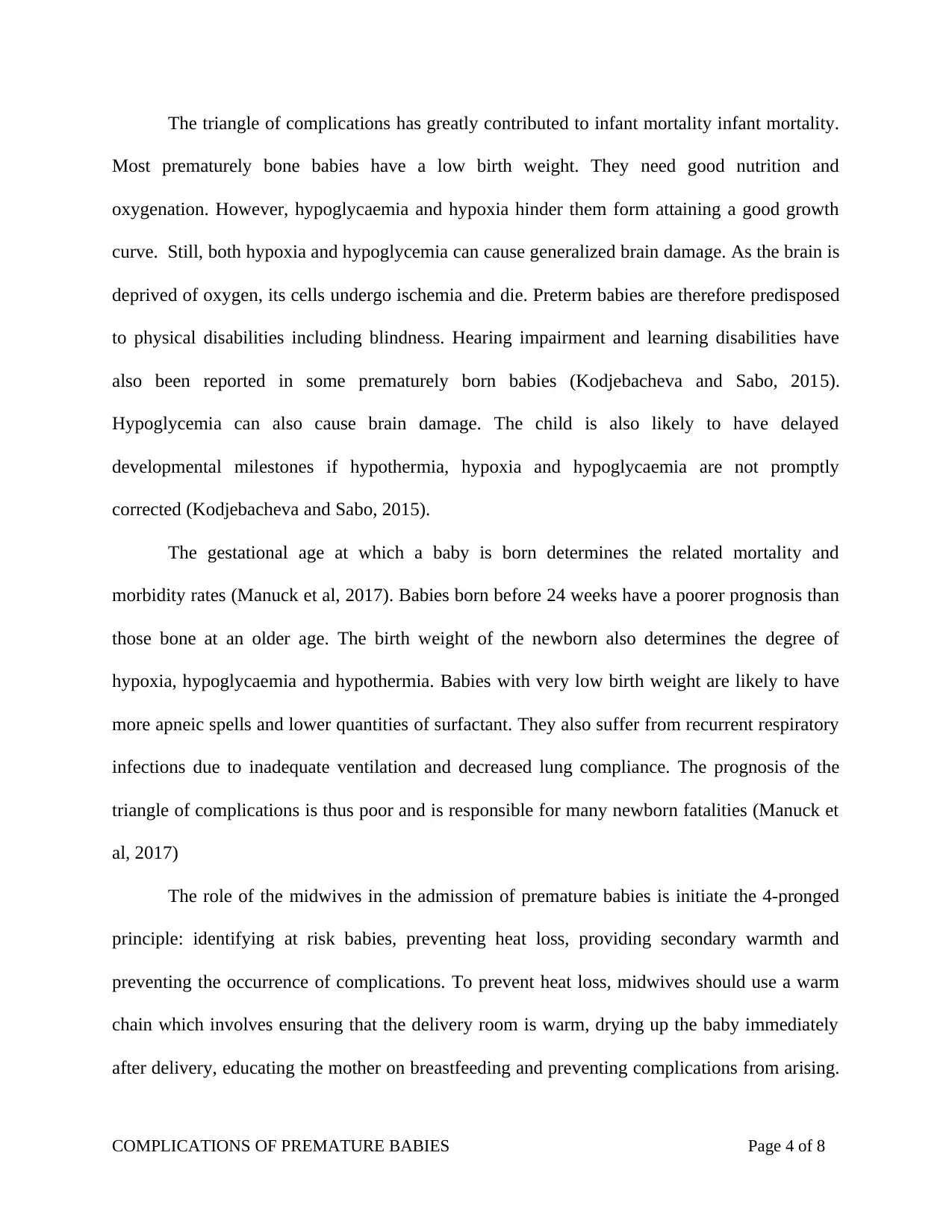
The triangle of complications has greatly contributed to infant mortality infant mortality.
Most prematurely bone babies have a low birth weight. They need good nutrition and
oxygenation. However, hypoglycaemia and hypoxia hinder them form attaining a good growth
curve. Still, both hypoxia and hypoglycemia can cause generalized brain damage. As the brain is
deprived of oxygen, its cells undergo ischemia and die. Preterm babies are therefore predisposed
to physical disabilities including blindness. Hearing impairment and learning disabilities have
also been reported in some prematurely born babies (Kodjebacheva and Sabo, 2015).
Hypoglycemia can also cause brain damage. The child is also likely to have delayed
developmental milestones if hypothermia, hypoxia and hypoglycaemia are not promptly
corrected (Kodjebacheva and Sabo, 2015).
The gestational age at which a baby is born determines the related mortality and
morbidity rates (Manuck et al, 2017). Babies born before 24 weeks have a poorer prognosis than
those bone at an older age. The birth weight of the newborn also determines the degree of
hypoxia, hypoglycaemia and hypothermia. Babies with very low birth weight are likely to have
more apneic spells and lower quantities of surfactant. They also suffer from recurrent respiratory
infections due to inadequate ventilation and decreased lung compliance. The prognosis of the
triangle of complications is thus poor and is responsible for many newborn fatalities (Manuck et
al, 2017)
The role of the midwives in the admission of premature babies is initiate the 4-pronged
principle: identifying at risk babies, preventing heat loss, providing secondary warmth and
preventing the occurrence of complications. To prevent heat loss, midwives should use a warm
chain which involves ensuring that the delivery room is warm, drying up the baby immediately
after delivery, educating the mother on breastfeeding and preventing complications from arising.
COMPLICATIONS OF PREMATURE BABIES Page 4 of 8
Most prematurely bone babies have a low birth weight. They need good nutrition and
oxygenation. However, hypoglycaemia and hypoxia hinder them form attaining a good growth
curve. Still, both hypoxia and hypoglycemia can cause generalized brain damage. As the brain is
deprived of oxygen, its cells undergo ischemia and die. Preterm babies are therefore predisposed
to physical disabilities including blindness. Hearing impairment and learning disabilities have
also been reported in some prematurely born babies (Kodjebacheva and Sabo, 2015).
Hypoglycemia can also cause brain damage. The child is also likely to have delayed
developmental milestones if hypothermia, hypoxia and hypoglycaemia are not promptly
corrected (Kodjebacheva and Sabo, 2015).
The gestational age at which a baby is born determines the related mortality and
morbidity rates (Manuck et al, 2017). Babies born before 24 weeks have a poorer prognosis than
those bone at an older age. The birth weight of the newborn also determines the degree of
hypoxia, hypoglycaemia and hypothermia. Babies with very low birth weight are likely to have
more apneic spells and lower quantities of surfactant. They also suffer from recurrent respiratory
infections due to inadequate ventilation and decreased lung compliance. The prognosis of the
triangle of complications is thus poor and is responsible for many newborn fatalities (Manuck et
al, 2017)
The role of the midwives in the admission of premature babies is initiate the 4-pronged
principle: identifying at risk babies, preventing heat loss, providing secondary warmth and
preventing the occurrence of complications. To prevent heat loss, midwives should use a warm
chain which involves ensuring that the delivery room is warm, drying up the baby immediately
after delivery, educating the mother on breastfeeding and preventing complications from arising.
COMPLICATIONS OF PREMATURE BABIES Page 4 of 8
Secure Best Marks with AI Grader
Need help grading? Try our AI Grader for instant feedback on your assignments.
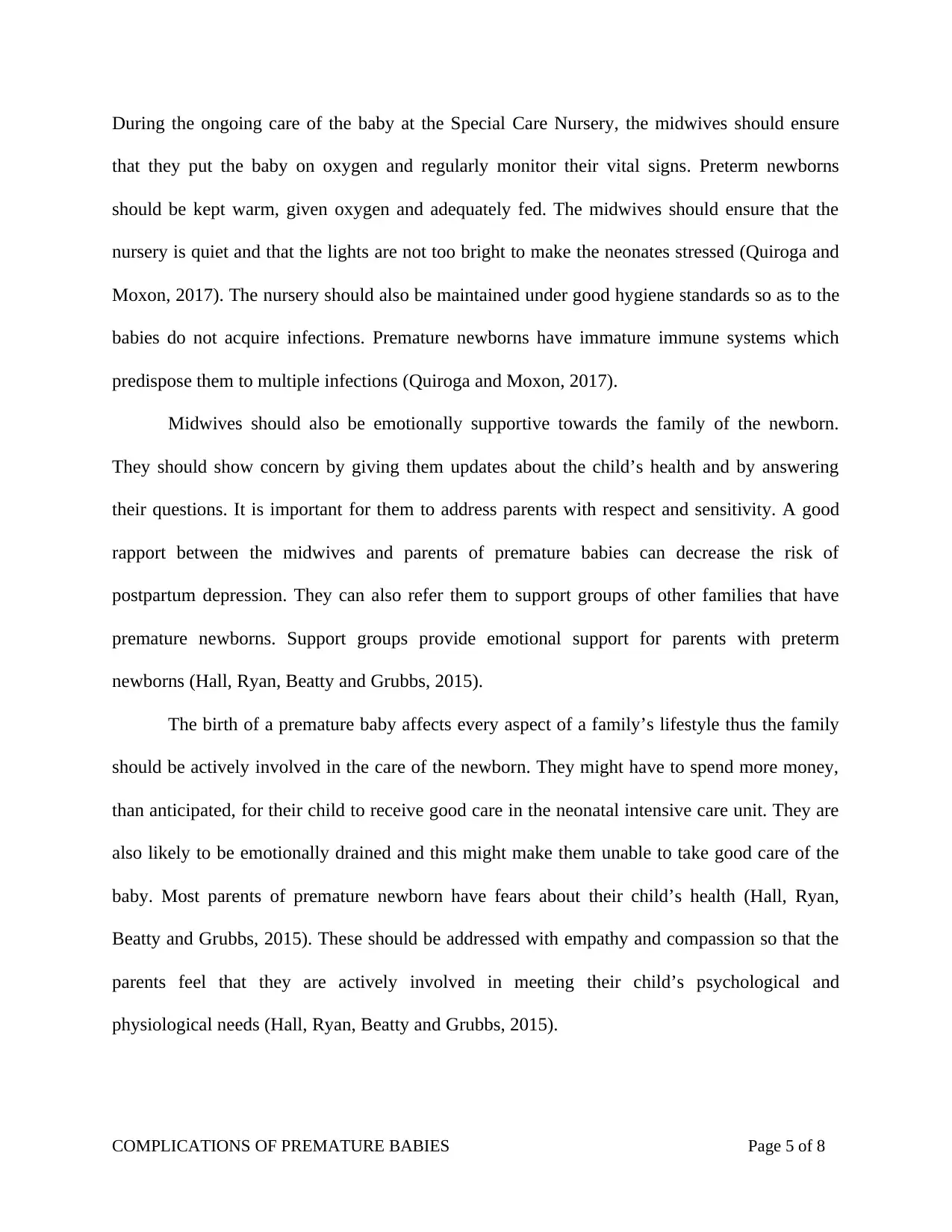
During the ongoing care of the baby at the Special Care Nursery, the midwives should ensure
that they put the baby on oxygen and regularly monitor their vital signs. Preterm newborns
should be kept warm, given oxygen and adequately fed. The midwives should ensure that the
nursery is quiet and that the lights are not too bright to make the neonates stressed (Quiroga and
Moxon, 2017). The nursery should also be maintained under good hygiene standards so as to the
babies do not acquire infections. Premature newborns have immature immune systems which
predispose them to multiple infections (Quiroga and Moxon, 2017).
Midwives should also be emotionally supportive towards the family of the newborn.
They should show concern by giving them updates about the child’s health and by answering
their questions. It is important for them to address parents with respect and sensitivity. A good
rapport between the midwives and parents of premature babies can decrease the risk of
postpartum depression. They can also refer them to support groups of other families that have
premature newborns. Support groups provide emotional support for parents with preterm
newborns (Hall, Ryan, Beatty and Grubbs, 2015).
The birth of a premature baby affects every aspect of a family’s lifestyle thus the family
should be actively involved in the care of the newborn. They might have to spend more money,
than anticipated, for their child to receive good care in the neonatal intensive care unit. They are
also likely to be emotionally drained and this might make them unable to take good care of the
baby. Most parents of premature newborn have fears about their child’s health (Hall, Ryan,
Beatty and Grubbs, 2015). These should be addressed with empathy and compassion so that the
parents feel that they are actively involved in meeting their child’s psychological and
physiological needs (Hall, Ryan, Beatty and Grubbs, 2015).
COMPLICATIONS OF PREMATURE BABIES Page 5 of 8
that they put the baby on oxygen and regularly monitor their vital signs. Preterm newborns
should be kept warm, given oxygen and adequately fed. The midwives should ensure that the
nursery is quiet and that the lights are not too bright to make the neonates stressed (Quiroga and
Moxon, 2017). The nursery should also be maintained under good hygiene standards so as to the
babies do not acquire infections. Premature newborns have immature immune systems which
predispose them to multiple infections (Quiroga and Moxon, 2017).
Midwives should also be emotionally supportive towards the family of the newborn.
They should show concern by giving them updates about the child’s health and by answering
their questions. It is important for them to address parents with respect and sensitivity. A good
rapport between the midwives and parents of premature babies can decrease the risk of
postpartum depression. They can also refer them to support groups of other families that have
premature newborns. Support groups provide emotional support for parents with preterm
newborns (Hall, Ryan, Beatty and Grubbs, 2015).
The birth of a premature baby affects every aspect of a family’s lifestyle thus the family
should be actively involved in the care of the newborn. They might have to spend more money,
than anticipated, for their child to receive good care in the neonatal intensive care unit. They are
also likely to be emotionally drained and this might make them unable to take good care of the
baby. Most parents of premature newborn have fears about their child’s health (Hall, Ryan,
Beatty and Grubbs, 2015). These should be addressed with empathy and compassion so that the
parents feel that they are actively involved in meeting their child’s psychological and
physiological needs (Hall, Ryan, Beatty and Grubbs, 2015).
COMPLICATIONS OF PREMATURE BABIES Page 5 of 8
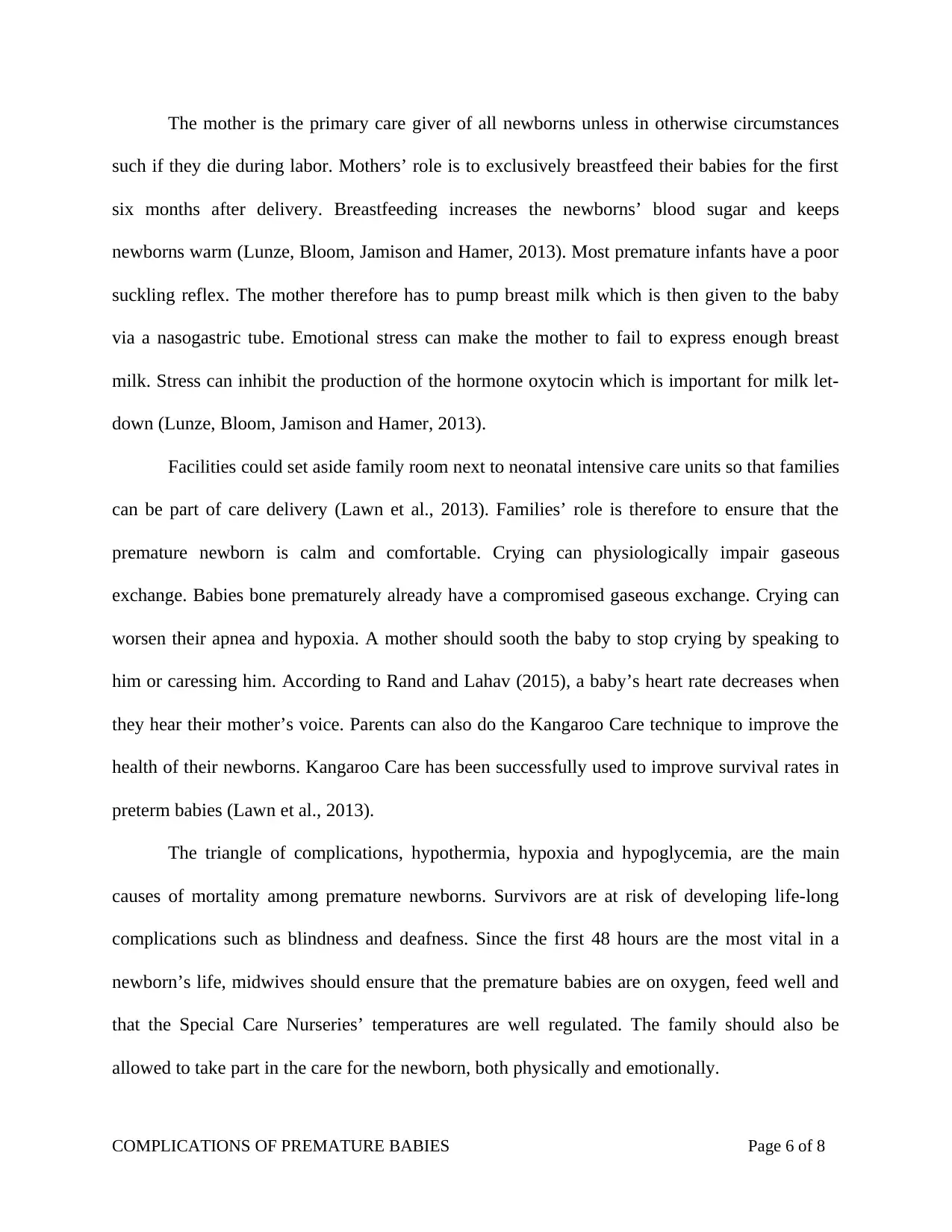
The mother is the primary care giver of all newborns unless in otherwise circumstances
such if they die during labor. Mothers’ role is to exclusively breastfeed their babies for the first
six months after delivery. Breastfeeding increases the newborns’ blood sugar and keeps
newborns warm (Lunze, Bloom, Jamison and Hamer, 2013). Most premature infants have a poor
suckling reflex. The mother therefore has to pump breast milk which is then given to the baby
via a nasogastric tube. Emotional stress can make the mother to fail to express enough breast
milk. Stress can inhibit the production of the hormone oxytocin which is important for milk let-
down (Lunze, Bloom, Jamison and Hamer, 2013).
Facilities could set aside family room next to neonatal intensive care units so that families
can be part of care delivery (Lawn et al., 2013). Families’ role is therefore to ensure that the
premature newborn is calm and comfortable. Crying can physiologically impair gaseous
exchange. Babies bone prematurely already have a compromised gaseous exchange. Crying can
worsen their apnea and hypoxia. A mother should sooth the baby to stop crying by speaking to
him or caressing him. According to Rand and Lahav (2015), a baby’s heart rate decreases when
they hear their mother’s voice. Parents can also do the Kangaroo Care technique to improve the
health of their newborns. Kangaroo Care has been successfully used to improve survival rates in
preterm babies (Lawn et al., 2013).
The triangle of complications, hypothermia, hypoxia and hypoglycemia, are the main
causes of mortality among premature newborns. Survivors are at risk of developing life-long
complications such as blindness and deafness. Since the first 48 hours are the most vital in a
newborn’s life, midwives should ensure that the premature babies are on oxygen, feed well and
that the Special Care Nurseries’ temperatures are well regulated. The family should also be
allowed to take part in the care for the newborn, both physically and emotionally.
COMPLICATIONS OF PREMATURE BABIES Page 6 of 8
such if they die during labor. Mothers’ role is to exclusively breastfeed their babies for the first
six months after delivery. Breastfeeding increases the newborns’ blood sugar and keeps
newborns warm (Lunze, Bloom, Jamison and Hamer, 2013). Most premature infants have a poor
suckling reflex. The mother therefore has to pump breast milk which is then given to the baby
via a nasogastric tube. Emotional stress can make the mother to fail to express enough breast
milk. Stress can inhibit the production of the hormone oxytocin which is important for milk let-
down (Lunze, Bloom, Jamison and Hamer, 2013).
Facilities could set aside family room next to neonatal intensive care units so that families
can be part of care delivery (Lawn et al., 2013). Families’ role is therefore to ensure that the
premature newborn is calm and comfortable. Crying can physiologically impair gaseous
exchange. Babies bone prematurely already have a compromised gaseous exchange. Crying can
worsen their apnea and hypoxia. A mother should sooth the baby to stop crying by speaking to
him or caressing him. According to Rand and Lahav (2015), a baby’s heart rate decreases when
they hear their mother’s voice. Parents can also do the Kangaroo Care technique to improve the
health of their newborns. Kangaroo Care has been successfully used to improve survival rates in
preterm babies (Lawn et al., 2013).
The triangle of complications, hypothermia, hypoxia and hypoglycemia, are the main
causes of mortality among premature newborns. Survivors are at risk of developing life-long
complications such as blindness and deafness. Since the first 48 hours are the most vital in a
newborn’s life, midwives should ensure that the premature babies are on oxygen, feed well and
that the Special Care Nurseries’ temperatures are well regulated. The family should also be
allowed to take part in the care for the newborn, both physically and emotionally.
COMPLICATIONS OF PREMATURE BABIES Page 6 of 8

COMPLICATIONS OF PREMATURE BABIES Page 7 of 8
Paraphrase This Document
Need a fresh take? Get an instant paraphrase of this document with our AI Paraphraser
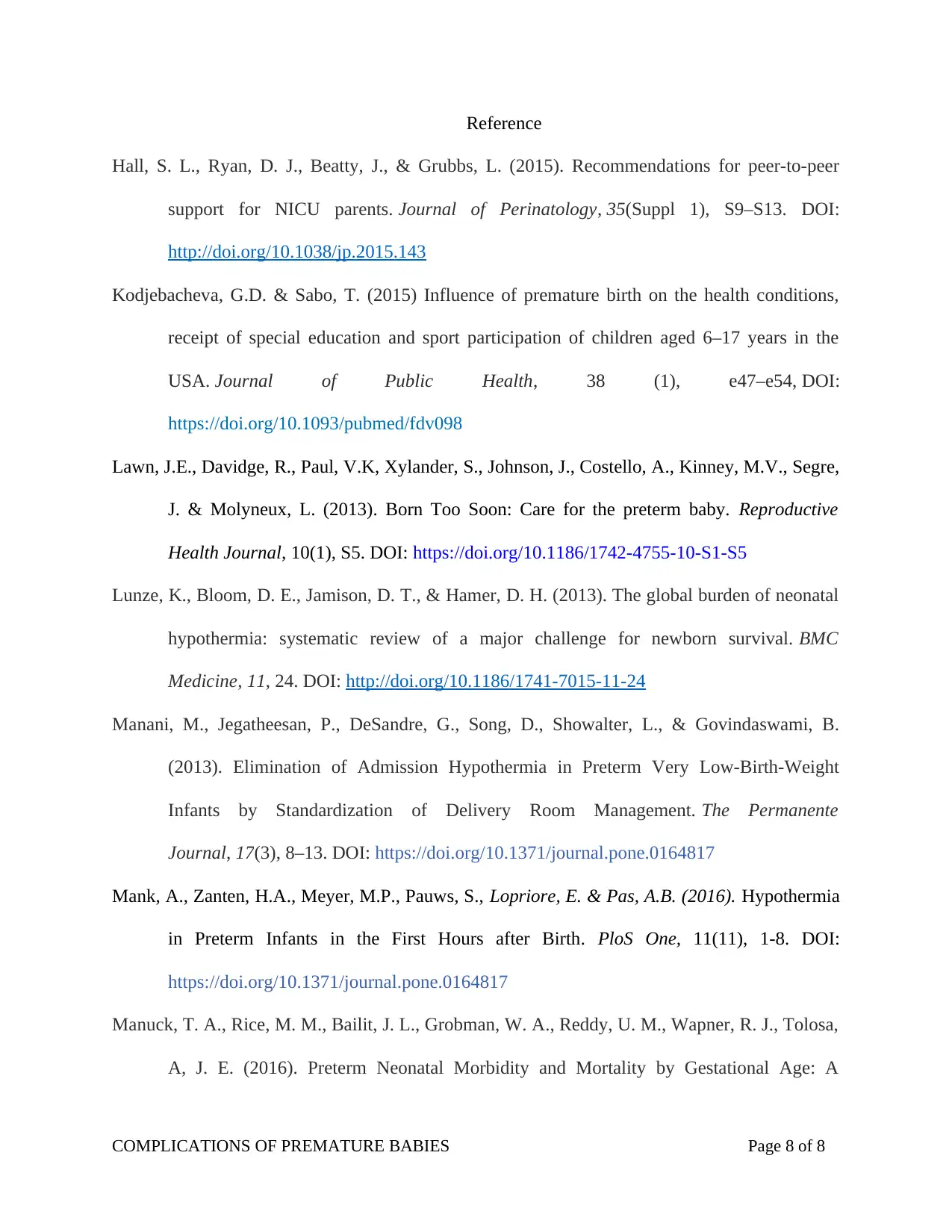
Reference
Hall, S. L., Ryan, D. J., Beatty, J., & Grubbs, L. (2015). Recommendations for peer-to-peer
support for NICU parents. Journal of Perinatology, 35(Suppl 1), S9–S13. DOI:
http://doi.org/10.1038/jp.2015.143
Kodjebacheva, G.D. & Sabo, T. (2015) Influence of premature birth on the health conditions,
receipt of special education and sport participation of children aged 6–17 years in the
USA. Journal of Public Health, 38 (1), e47–e54, DOI:
https://doi.org/10.1093/pubmed/fdv098
Lawn, J.E., Davidge, R., Paul, V.K, Xylander, S., Johnson, J., Costello, A., Kinney, M.V., Segre,
J. & Molyneux, L. (2013). Born Too Soon: Care for the preterm baby. Reproductive
Health Journal, 10(1), S5. DOI: https://doi.org/10.1186/1742-4755-10-S1-S5
Lunze, K., Bloom, D. E., Jamison, D. T., & Hamer, D. H. (2013). The global burden of neonatal
hypothermia: systematic review of a major challenge for newborn survival. BMC
Medicine, 11, 24. DOI: http://doi.org/10.1186/1741-7015-11-24
Manani, M., Jegatheesan, P., DeSandre, G., Song, D., Showalter, L., & Govindaswami, B.
(2013). Elimination of Admission Hypothermia in Preterm Very Low-Birth-Weight
Infants by Standardization of Delivery Room Management. The Permanente
Journal, 17(3), 8–13. DOI: https://doi.org/10.1371/journal.pone.0164817
Mank, A., Zanten, H.A., Meyer, M.P., Pauws, S., Lopriore, E. & Pas, A.B. (2016). Hypothermia
in Preterm Infants in the First Hours after Birth. PloS One, 11(11), 1-8. DOI:
https://doi.org/10.1371/journal.pone.0164817
Manuck, T. A., Rice, M. M., Bailit, J. L., Grobman, W. A., Reddy, U. M., Wapner, R. J., Tolosa,
A, J. E. (2016). Preterm Neonatal Morbidity and Mortality by Gestational Age: A
COMPLICATIONS OF PREMATURE BABIES Page 8 of 8
Hall, S. L., Ryan, D. J., Beatty, J., & Grubbs, L. (2015). Recommendations for peer-to-peer
support for NICU parents. Journal of Perinatology, 35(Suppl 1), S9–S13. DOI:
http://doi.org/10.1038/jp.2015.143
Kodjebacheva, G.D. & Sabo, T. (2015) Influence of premature birth on the health conditions,
receipt of special education and sport participation of children aged 6–17 years in the
USA. Journal of Public Health, 38 (1), e47–e54, DOI:
https://doi.org/10.1093/pubmed/fdv098
Lawn, J.E., Davidge, R., Paul, V.K, Xylander, S., Johnson, J., Costello, A., Kinney, M.V., Segre,
J. & Molyneux, L. (2013). Born Too Soon: Care for the preterm baby. Reproductive
Health Journal, 10(1), S5. DOI: https://doi.org/10.1186/1742-4755-10-S1-S5
Lunze, K., Bloom, D. E., Jamison, D. T., & Hamer, D. H. (2013). The global burden of neonatal
hypothermia: systematic review of a major challenge for newborn survival. BMC
Medicine, 11, 24. DOI: http://doi.org/10.1186/1741-7015-11-24
Manani, M., Jegatheesan, P., DeSandre, G., Song, D., Showalter, L., & Govindaswami, B.
(2013). Elimination of Admission Hypothermia in Preterm Very Low-Birth-Weight
Infants by Standardization of Delivery Room Management. The Permanente
Journal, 17(3), 8–13. DOI: https://doi.org/10.1371/journal.pone.0164817
Mank, A., Zanten, H.A., Meyer, M.P., Pauws, S., Lopriore, E. & Pas, A.B. (2016). Hypothermia
in Preterm Infants in the First Hours after Birth. PloS One, 11(11), 1-8. DOI:
https://doi.org/10.1371/journal.pone.0164817
Manuck, T. A., Rice, M. M., Bailit, J. L., Grobman, W. A., Reddy, U. M., Wapner, R. J., Tolosa,
A, J. E. (2016). Preterm Neonatal Morbidity and Mortality by Gestational Age: A
COMPLICATIONS OF PREMATURE BABIES Page 8 of 8
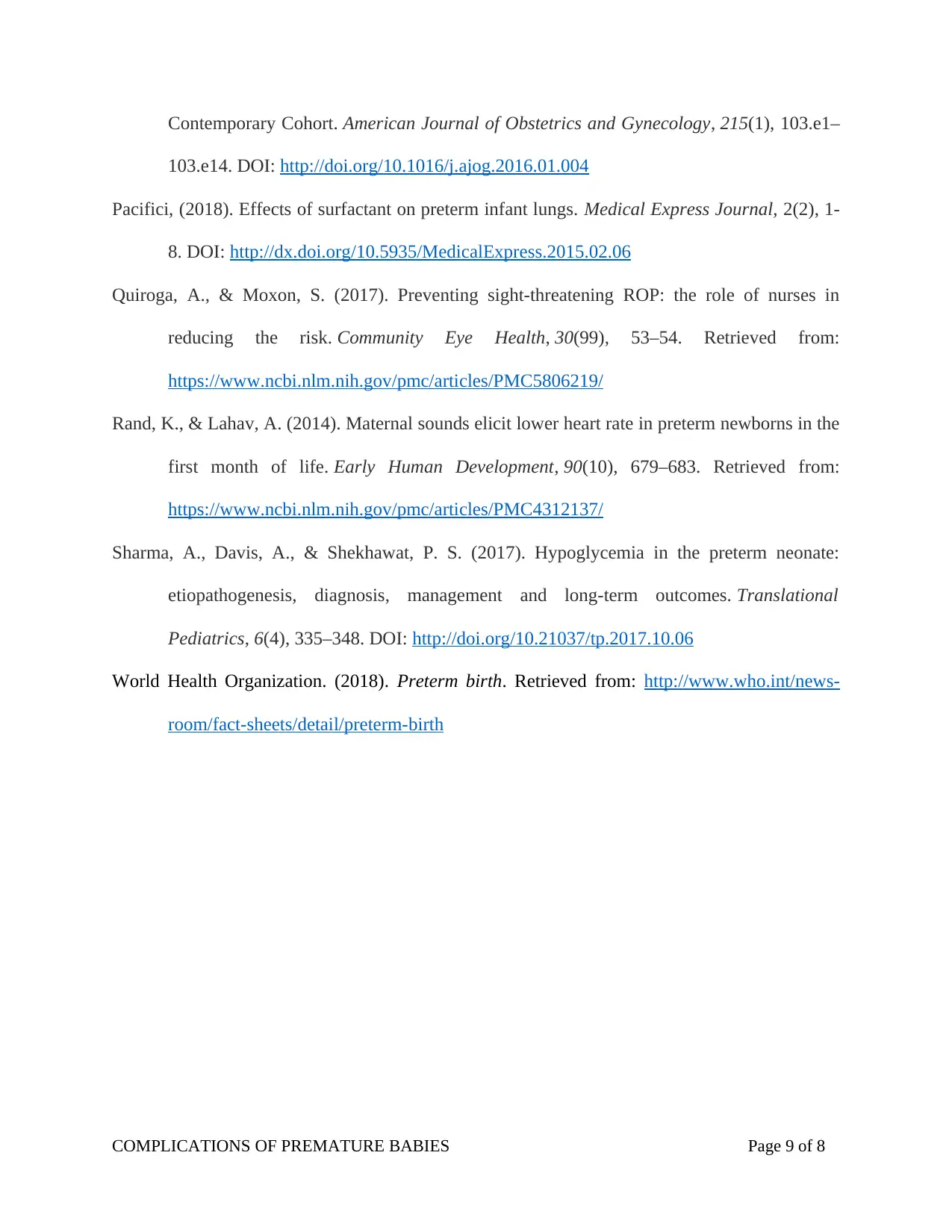
Contemporary Cohort. American Journal of Obstetrics and Gynecology, 215(1), 103.e1–
103.e14. DOI: http://doi.org/10.1016/j.ajog.2016.01.004
Pacifici, (2018). Effects of surfactant on preterm infant lungs. Medical Express Journal, 2(2), 1-
8. DOI: http://dx.doi.org/10.5935/MedicalExpress.2015.02.06
Quiroga, A., & Moxon, S. (2017). Preventing sight-threatening ROP: the role of nurses in
reducing the risk. Community Eye Health, 30(99), 53–54. Retrieved from:
https://www.ncbi.nlm.nih.gov/pmc/articles/PMC5806219/
Rand, K., & Lahav, A. (2014). Maternal sounds elicit lower heart rate in preterm newborns in the
first month of life. Early Human Development, 90(10), 679–683. Retrieved from:
https://www.ncbi.nlm.nih.gov/pmc/articles/PMC4312137/
Sharma, A., Davis, A., & Shekhawat, P. S. (2017). Hypoglycemia in the preterm neonate:
etiopathogenesis, diagnosis, management and long-term outcomes. Translational
Pediatrics, 6(4), 335–348. DOI: http://doi.org/10.21037/tp.2017.10.06
World Health Organization. (2018). Preterm birth. Retrieved from: http://www.who.int/news-
room/fact-sheets/detail/preterm-birth
COMPLICATIONS OF PREMATURE BABIES Page 9 of 8
103.e14. DOI: http://doi.org/10.1016/j.ajog.2016.01.004
Pacifici, (2018). Effects of surfactant on preterm infant lungs. Medical Express Journal, 2(2), 1-
8. DOI: http://dx.doi.org/10.5935/MedicalExpress.2015.02.06
Quiroga, A., & Moxon, S. (2017). Preventing sight-threatening ROP: the role of nurses in
reducing the risk. Community Eye Health, 30(99), 53–54. Retrieved from:
https://www.ncbi.nlm.nih.gov/pmc/articles/PMC5806219/
Rand, K., & Lahav, A. (2014). Maternal sounds elicit lower heart rate in preterm newborns in the
first month of life. Early Human Development, 90(10), 679–683. Retrieved from:
https://www.ncbi.nlm.nih.gov/pmc/articles/PMC4312137/
Sharma, A., Davis, A., & Shekhawat, P. S. (2017). Hypoglycemia in the preterm neonate:
etiopathogenesis, diagnosis, management and long-term outcomes. Translational
Pediatrics, 6(4), 335–348. DOI: http://doi.org/10.21037/tp.2017.10.06
World Health Organization. (2018). Preterm birth. Retrieved from: http://www.who.int/news-
room/fact-sheets/detail/preterm-birth
COMPLICATIONS OF PREMATURE BABIES Page 9 of 8
1 out of 9
Your All-in-One AI-Powered Toolkit for Academic Success.
+13062052269
info@desklib.com
Available 24*7 on WhatsApp / Email
![[object Object]](/_next/static/media/star-bottom.7253800d.svg)
Unlock your academic potential
© 2024 | Zucol Services PVT LTD | All rights reserved.